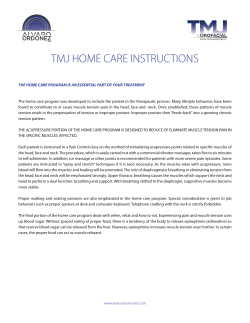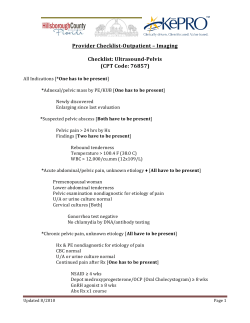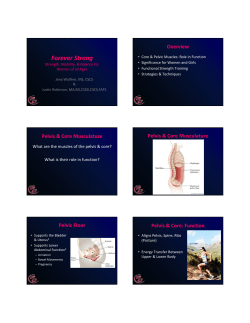
Physiotherapy Physiotherapy & Child Birth
Physiotherapy & Child Birth Physiotherapy CHANGE TO MUSCLES, LIGAMENTS AND JOINTS DURING AND AFTER PREGNANCY AFFECT THE WHOLE BODY. PHYSIOTHERAPISTS HELP WOMEN MANAGE THESE CHANGES, PROVIDING EXPERT CARE AND ADVICE DURING PREGNANCY, CHILDBIRTH AND BEYOND. CHILDBIRTH PREPARATION CLASSES When preparing for childbirth and parenthood, women and their partners benefit from learning a range of physical techniques and coping skills. Physiotherapists have the expertise to teach these skills, which include positioning, rhythmic movement, massage, relaxation and breathing awareness. FITNESS CLASSES Exercise during pregnancy assists a return to normal body shape, muscle tone and strength after the baby is born. Physiotherapists run ante-natal and post-natal low impact exercise classes (some in water) specifically for pregnant women and new mothers. These classes are designed to strengthen muscles, relieve pain and improve general fitness. Exercise in water has a number of particular benefits such as relieving swollen legs and promoting relaxation. BACK AND NECK PAIN The weight of a growing baby causes changes to posture and puts strain on the back, pelvis, neck and shoulders. After the birth, everyday activities like lifting, carrying and feeding the baby can also lead to muscle soreness and joint problems. Physiotherapists help women prevent and overcome pain in these areas through safe and effective therapies, including specific strengthening and stretching exercises, posture correction, gentle spinal movement and massage. physiotherapy.asn.au ABDOMINAL MUSCLE WEAKNESS GENERAL During pregnancy, the abdominal muscles are stretched and weakened. They may also separate down the midline. Abdominal muscle weakness results in poor muscle control and backache. Physiotherapists are trained to prescribe specific abdominal exercises to assist full recovery. Many physiotherapists in private practice are listed in the Yellow Pages. Physiotherapists also work in public hospitals, residential aged care facilities and community health centres. Check to see if a physiotherapist is a member of the APA. Members of the APA are bound by a professional Code of Ethics and have access to extensive and continuing postgraduate education programmes. BREAST PROBLEMS Blocked breast ducts and mastitis cause pain and breastfeeding difficulties. Physiotherapists use ultrasound and massage to help mothers continue breastfeeding. INCONTINENCE AND PROLAPSE HEALTH REBATES You may consult a physiotherapist either directly or by referral from your medical practitioner. Most private health insurance funds offer rebates for physiotherapy treatment. The pelvic floor muscles help support the pelvic organs. Pregnancy and childbirth may weaken these muscles, increasing the risk of incontinence (uncontrolled loss of urine or faeces) and prolapse (pelvic organs bulging into the vagina). Straining from constipation can also damage the pelvic floor muscles. YOUR COMPLIMENTARY COPY SUPPLIED BY © 2011 Australian Physiotherapy Association. ABN 89 004 265 150 2512 Physiotherapy & Child Birth With expert assessment, treatment and instruction in self-help techniques, physiotherapists can help women prevent or reduce those problems.
© Copyright 2025





















